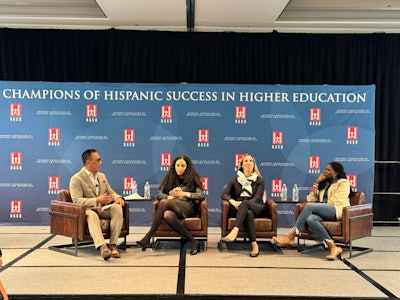CHICAGO--
The journey to diversify the workforce can be long and arduous, but should be one of the nation’s top priorities, said a group of corporate executives who appeared on a panel at the Hispanic Association of Colleges and Universities (HACU) annual conference.
“When we talk about Diversity, Equity, Inclusion, and Belonging (DEIB) and a diverse workforce, always be centered on your why,” said Olivia Jefferson, vice president of philanthropic programs at UnitedHealthcare, who said that for many minoritized executives like herself, the higher they climb the corporate ladder, the lonelier these spaces tend to be.
Johnson joined representatives from Google and Dominion Energy to talk about the importance of focusing on DEIB within the workforce. The panel titled, “Embracing Diversity, Equity, Inclusion, and Belonging: Catalysts for a Flourishing Workforce,” focused in on the importance of creating an environment that values and leverages the unique perspectives, experiences and talents of all employees.
“Match the passion with the strategy,” said Jefferson, who told attendees at the HACU Town Hall that being a DEIB advocate requires a strategic approach to a set of outcomes and goals. “This is not about you. This is about getting the work done.”
That work, Jefferson admits, can be hard and tiresome, often requiring DEI practitioners to take a broad approach to inclusivity.
“We can never be complacent in the work,” she warned. “We have to keep pushing forward.”
That message resonated with Maria P. Tamburri, vice president of diversity, equity & inclusion and employee engagement with Dominion Energy. She said that the creation of Employee Resources Groups (ERGs) or Business Resource Groups (BRGs) can be instrumental in helping an organization reach its DEI goals and improve culture and climate.
“Our employees come together, they have experiences together,” she said, adding that these affinity groups can build safe spaces within a workplace, while also helping to attract individuals from other groups who are interested in learning more about various cultures. “It’s important that these spaces are inviting for everyone and it’s really awesome to see the learning that takes place.”
For Audrey Stewart, head of DEI programs and reporting at Google, “diversity is achievable,” but “inclusion has to be believable.”
“You don’t have to have a DEI title, in order to do DEI work,” she said.
As several states—namely Florida and Texas—continue to push anti-DEI legislation, Dr. Antonio Flores, HACU’s president said that the corporate sector should join forces with education leaders to push back against these “reactionary set of initiatives.”
“We have to develop a strategy where companies put pressure on these states,” said Flores, adding that the financial imperatives will likely derail such discriminator legislation in the long run. “The longer we let them do it, the longer they will be entrenched.”















